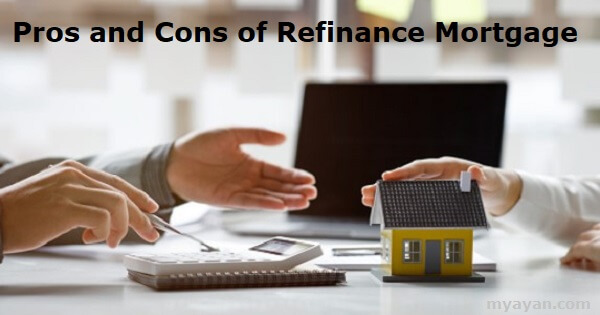Refinancing becomes the last resort for borrowers when they find themselves incapable of clearing their existing loans. It seems quite like a solution to the fiscal problems. Though, lenders have a different story to tell. According to Lending Tree, Americans owe nearly $ 12 million on their existing mortgages. And with staggering interest rates, the burden seems to grow.
The most common reasons for refinancing are to lower your monthly payments by reducing your interest rate or to convert from an adjustable-rate mortgage (ARM) to a fixed-rate mortgage.
It could also be used as part of debt consolidation efforts, tapping into home equity funds to pay down other debts. When considering whether or not to refinance, it is important that you weigh the total costs associated with the transaction and compare them against any potential savings over the life of the loan. Given that there are pros and cons of refinance mortgages, let's look at each one.
The advantages of a Refinance mortgage can be significant; however, it all depends on the terms of the refinance and your individual needs. If you decide to take this step, there may be some benefits you can entertain, including:
A lot can happen between the period of your loan purchase and when you decide to refinance. The Federal Reserve can lower interest rates and make loans more attractive, or your credit score may improve over time. A refinance mortgage allows homeowners to capitalize on these changes in the market and get a better deal on their loan.
When you refinance, you can extend your repayment timeline. This could potentially lower your payments even further. Increasing the term of your loan from 15 to 30 years can significantly reduce monthly costs, enabling borrowers to free up funds for other expenses.
Homeowners who are struggling with multiple debts from varying sources can use refinancing as an effective debt consolidation tool by rolling all existing debts into one mortgage. This can simplify the repayment process and potentially lower overall payments.
By refinancing your mortgage with the same term, you can extend the amount of time it takes to pay off the loan, resulting in a lower monthly payment. And if you're able to acquire a loan at an even lower interest rate than before, then those savings will be reflected in your payments as well. For example, if your original loan had an interest rate of 6%, and you refinance at 4%, your new payment will be lower.
When you refinance, the lender may finance a larger loan amount than you currently owe. Let's say you are refinancing your mortgage for $200,000 and have $50,000 in equity. The new loan can be financed up to $250,000, meaning that you now have access to an extra $50,000, some or all of which could be used to cover any existing expenses.
Refinancing may not be the best choice for everyone, and there are various factors you should consider before taking action. Here is a list of potential downsides to a Refinance mortgage that could affect your financial stability.
Refinancing is not free; the process incurs closing costs just like when you originally purchased the loan. These fees include application fees, title searches, and appraisal reports. They can add up quickly, so make sure you factor them into your refinancing equation if you want to save money in the long run.
Depending on your available equity, it may not be possible to refinance and tap into additional funds. If your current loan balance exceeds the value of your home, then a cash-out refinance is no longer an option.
When you extend the term of your loan by refinancing, you are essentially paying for more years of interest payments, increasing the total cost of borrowing. Considering this before signing up for a new mortgage with an extended repayment timeline would be wise.
While the IRS does not require you to report cash-out to refinance proceeds on your taxes, it is important to consider the potential implications of any such transaction. You could be subject to capital gains taxes if you use the cash from a refinanced loan for anything other than home improvements (such as investments).
When it comes to money, there will always be risks associated with market fluctuations and changes in interest rates. It's impossible to predict what could happen over time, so you must weigh all the pros and cons before deciding to refinish your mortgage.
Conclusion
Let's fit key factors into perspective here and summarize them. As you begin to understand refinancing your mortgage, it’s important to assess if this is truly a step beneficial for yourself based on your interest rates and how long you plan to stay in your home. Consulting an experienced home loan expert will help you analyze which refinance loan best suits your individual needs. They can also recommend other loan options that could be more beneficial to refinance mortgage options. After all, each person's decision should depend on their unique goals and situation.

Refinancing can be a great way to save money if you find a loan with a lower interest rate than your current mortgage. It also gives you an opportunity to tap into any existing equity in your home.
It depends on the lender and refinances of the loan. Generally, most lenders require borrowers to have a minimum credit score and income level to qualify for refinancing.
Refinancing has potential drawbacks, such as high closing costs and limited equity. Extending the term of your loan also means you will be paying more interest over time. There is also the possibility of unforeseen changes in the market that could affect your decision.
The best way to determine whether refinancing is a good option is to consult an experienced mortgage professional. They will be able to assess your needs and advise you on the most suitable loan product depending on your current fiscal conditions such as income, savings, and existing loans.